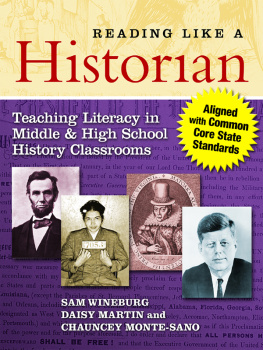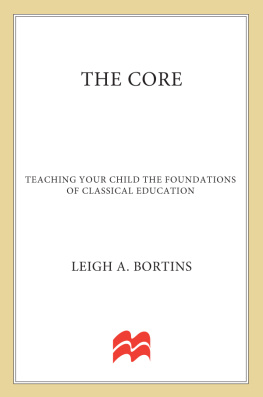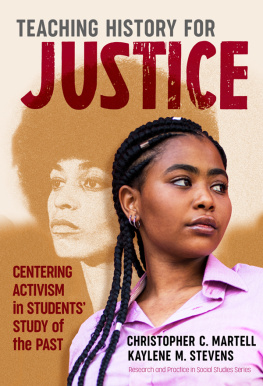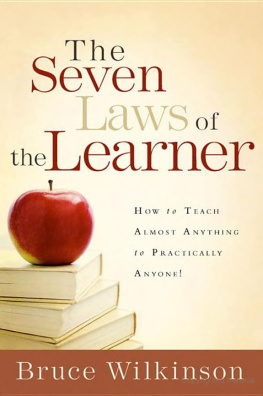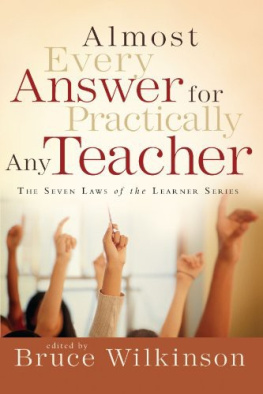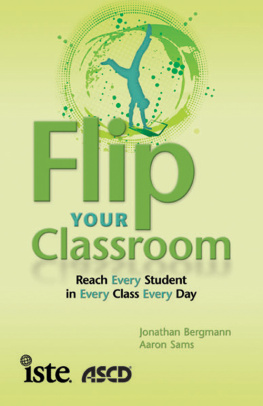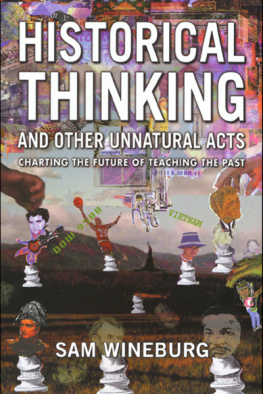Why Wont You Just Tell Us the Answer?
Teaching Historical Thinking in Grades 712
Bruce A. Lesh
Forware by Edward L. Ayers

Stenhouse Publishers
www.stenhouse.com
Copyright 2011 by Bruce A. Lesh
All rights reserved. No part of this publication may be reproduced or transmitted in any form or by any means, electronic or mechanical, including photocopy, or any information storage and retrieval system, without permission from the publisher.
Every effort has been made to contact copyright holders and students for permission to reproduce borrowed material. We regret any oversights that may have occurred and will be pleased to rectify them in subsequent reprints of the work.
Credits are on .
Library of Congress Cataloging-in-Publication Data
Lesh, Bruce A.
Why wont you just tell us the answer?: teaching historical thinking in grades 712 / Bruce A. Lesh; foreword by Ed Ayres.
p. cm.
Reinventing my classroom: making historical thinking realityIntroducing historical thinking: Nat Turners Rebellion of 1831Text, subtext, and context: evaluating evidence and exploring President Theodore Roosevelt and the Panama CanalUsing the Rail Strike of 1877 to teach chronological thinking and causalityRevolution in the air: Using the Bonus March of 1932 to teach multiple perspectivesContinuity and change over time: Custers last stand or the Battle of the greasy grass?Long or short?: using the civil rights movement to teach historical significanceTrying on the shoes of historical actors: using the Truman-MacArthur Debate to teach historical empathyHow am I supposed to do this every day?: historical investigations versus sleepOvercoming the barrier to change.
Includes bibliographical references and index.
ISBN 978-1-57110-812-8 (pbk.: alk. paper)ISBN 978-1-57110-906-4 (e-book)
1. United StatesHistoryStudy and teaching (Secondary). I. Title.
E175.8.L48 2011
973.071dc22
2010050306
Cover design, interior design, and typesetting by Martha Drury
Manufactured in the United States of America

17 16 15 14 13 12 11 9 8 7 6 5 4 3 2 1
For my parents
Contents
Foreword
History is the subject that American students take most often in school and appreciate the least. From the time they cut out turkeys around the shape of their small hands to commemorate the Pilgrims and Indians at Thanksgiving to the time they sweat through Standards of Learning exams, American students are continually exposed to the American past. The teaching of U.S. history is a huge business, with publishers of textbooks vying for the contracts of entire states, and the number of Web sites, videos, and enrichment activities constantly escalates. Despite these investments and innovations, pundits and politicians regularly declare themselves shocked to discover that our kids do not know the basic facts of history. Conflicts about the teaching and interpretation of history routinely erupt on the public stage.
Why is this? Why is a subject that is intrinsically accessible and interesting so problematic? Everyone has his or her favorite culprit, whether it is too great a reliance on textbooks and the dry facts they relate or too little reliance on standardized materials and hard facts. The left blames the right, and vice versa. Caught in the middle are the teachers who must navigate this minefield every day, every class period. Bearing the burdens of building citizenship along with critical thinking skills, of covering the entire span of our ever-lengthening history for ever more detailed tests, teachers of history might despair.
Faced with these challenges, all teachers of history would do well to read Bruce Leshs book. The product of nearly twenty years of teaching and thinking about teaching, these pages are full of patience, wisdom, and humor. They are also full of determination that history be taught in ways that forever change the students who learn it. Lesh does not himself talk in such dramatic language, for he is refreshingly modest, but it is clear that he is not satisfied if the young people leaving his classroom do not see the world differently as a result of his teaching. Reading the fascinating stories and examples Lesh offers here, it is clear that many students are broadened and deepened and made more curious by their time in his class. All of us who teach history should have the same determination.
Leshs techniques are built on the lessons of hard experience. He admits that he has tried things that have not worked, that he sometimes has tried too hard to include too much. He admits that fifteen-year-olds are not always focused on the matter at hand. He admits that controlling a class is a requirement for learning, and that standardized tests wait at the end of even the most innovative course of study. The advice he offers, in other words, is the most useful kind: borne of personal success and failure, of small triumphs and the certain knowledge that the class can be taught better next time.
As devoted as he is to the secondary school history classroom, Lesh also draws inspiration from his fellow teachers down the hall, in math and chemistry and English classes. He takes the best that academic historians have to offer without getting bogged down in their debates and details. Lesh has been an important leader at the local, state, and national levels, especially in his work with the National Council for History Education. In that work, where I have seen his passion and skill firsthand, Lesh is a powerful voice for the classroom teacher.
Bruce Lesh believes that students learn history best by discovering its patterns and secrets for themselves. He provides guidance and examples here, sharing useful frameworks and sources. But he also provides the one ingredient that is too often missing in our history classrooms: trust in the individual teacher. He knows that we all bring our own energies, experiences, and hopes to our teaching, and he leaves room for those elements to work. In short, Bruce Lesh has given a wonderful gift to everyone who teaches history.
Edward L. Ayers
President and Professor of History
University of Richmond
Winner of the Bancroft Prize and named National Professor of the Year by the
Carnegie Foundation for the Advancement of Teaching
Acknowledgments
The first book I ever wrote was titled Paul the Ant and the Invasion from Space. Not a best seller, it was still my inspiration to write. For that encouragement I have two loving parents to thank. The opportunity to write this book is one that has pushed me intellectually and emotionally, but I would not have even tried had you two not stapled paper together and encouraged me to write about the exploits of Paul and his insect pals. Thanks for all the time, love, guidance, and especially patience over the course of my life.
Sarah Drake Brown, Noralee Franklel, Tina Nelson, John Billingslea, Wendy Schanberger, Brigette Sheckells, and Mike Walsh graciously provided their time and abilities to read and comment on portions of this manuscript. Other colleagues, Catherine Holden, Rex Shepard, Phil Nicolosi, Jim Percoco, Carol Berkin, Mark Stout, Bruce VanSledright, and Fritz Fischer read the entire manuscript. This book would be less effective without their cogent comments, and I am grateful for their time, candor, and support.


